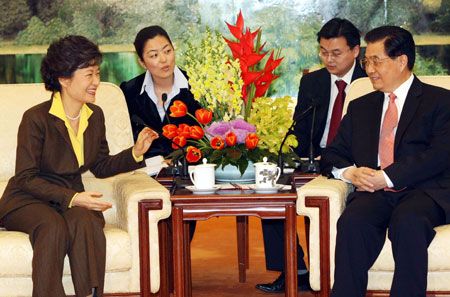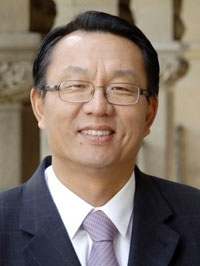Park needs sophisticated ‘envoy diplomacy’ for China ties

Rep. Park Geun-hye, left, talks with Chinese President Hu Jintao in Beijing in this 2008 file photo. / Korea Times
BEIJING – The incoming Park Geun-hye administration should adopt a pretty sophisticated “envoy diplomacy” to patch up strained ties with China, while continuing to carefully steer Seoul’s alliance with the United States, said Shin Gi-wook, the director of the Walter H. Shorenstein Asia-Pacific Research Center at Stanford University.
“The first few months will be the key,” Shin told The Korea Times.
As if to make sure this writer clearly understood his point, he repeated the words throughout the interview. His strong sense of needing to emphasize the timing should be seen in the context of a “missed opportunity” on the part of the outgoing President Lee Myung-bak.
“It’s a near consensus among experts that the Lee Myung-bak administration didn’t give enough attention to China. Especially, he didn’t handle ties with China well during the first period of his administration,” noted Shin, a well-known observer of Korea’s foreign policy ties with neighboring powers.
“Lee felt that his predecessor Roh Moo-hyun neglected South Korea’s traditional alliance with Washington. Once sworn in, Lee therefore was so eager to tilt the diplomatic balance back toward Washington. In that process, he had poor communication with China, a rising superpower. As a consequence, his ties with China have never recovered,” said Shin.
Pundits all point out that Park’s major diplomatic challenge is how to position between Washington and Beijing, who are competing with each other for global leadership. Seoul relies on the former for security, the latter for economic growth. But most fall short of offering a prescription on the specifics of diplomatic maneuvering, revealing that it is easier said than done.
Shin boldly shares his prescription for Park, which is to make good use of envoy diplomacy. According to him, Park should send the same person to the relevant countries, including the United States, China, and also North Korea, to discuss and cooperate on specific issues, rather than “just say hello.” The timing for sending the envoy should be right after the inauguration, not before. He believes that Park’s transitional team should be the architects of the envoy diplomacy and its contents now. Below is an excerpt from the interview.
Korea Times: Let’s start from what you expect the foreign policy posture of the incoming Park Geun-hye administration to be.
Shin Gi-wook: Just like Lee Myung-bak’s government, the new Park Geun-hye administration will have the U.S.-South Korea alliance at the center of the nation’s foreign policy. It will also strive to improve ties with China, but that won’t be at the same high level as Seoul’s traditional alliance with Washington.
KT: China’s new head of the Communist Party Xi Jinping called for a “new type of great power relationship in the 21st century.” Analysts view that China is challenging the global leadership of the United States by suggesting that Washington needs to make room for China’s rising power. Given this, some pundits think that China wants Seoul to give it “equal status,” commensurate with Seoul’s attention to Washington.
Shin: I know the view is popular among some analysts. But my talking with Chinese experts reveals that the Chinese leadership has a pretty realistic expectation. It understands the special nature of the Seoul-Washington alliance. The important thing for Park Geun-hye’s foreign policy team to keep in mind is that it shouldn’t try to solve all the diplomatic problems through the Seoul-Washington alliance. This was the mistake Lee made. Equally important is to explain to China and communicate with China.
KT: That sounds easier said than done.
Shin: Precisely that’s where the challenge is. South Korea cannot control all the situations that arise. For example, if North Korea suddenly causes provocation, as seen in the Cheonan incident, everyone on the table will fall back to their default position. For example, Seoul and Washington will criticize North Korea. China will be protective of Pyongyang as usual. Even though Park wants to improve relations with Pyongyang, if Pyongyang launches a third nuclear test, then it will greatly limit Park’s diplomatic options, because she will be pressured from within domestic politics to punish Pyongyang. Many things will arise and many things are unpredictable.
KT: I think The Korea Times readers want to know whether you have a solution for this. I mean a specific one.
Shin: I want to stress two points. Firstly, send the same person to the relevant countries, in this case, the United States, China and North Korea, to discuss and cooperate on specific issues, rather than “just say hello.” Secondly, send the envoy right after the inauguration, not before. The use of special envoy should be one of the main items of discussion and preparation by the transitional team.
KT: Sending envoys is something a president does all the time. President Lee Myung-bak also sent Park Geun-hye as a special envoy to China, upon his election five years ago.
Shin: At that time, Lee sent different envoys to different countries. That’s not a way to go. That’s a media show. Lee as the president-elect sent his brother to Japan, lawmaker Chung Mong-joon to the U.S., and so on. And later these countries compared which envoy was higher and closer to Lee. They interpreted it as a “sign” of how much importance Lee attached to these countries. I hope this time Park sends a single person to different countries. In that way, Park can reduce confusion and maintain better consistency of message.
KT: At this time, Park’s foreign policy team may not have a full road map. What kind of messages can she deliver to the relevant countries?
Shin: That’s a good point. Park should explain to these countries that it will take some time. And they will understand this. You know, the purpose is to build confidence and stave off misunderstandings that arise during the initial period of her presidency. By the same token, I hope Park also sends the envoy to North Korea as well. She can explain that she is thinking of ways of improving inter-Korean ties and ask North Korea to refrain from any provocative actions that can significantly reduce Parks’ options in South Korea’s domestic politics. Finally, I hope Park deploys envoy diplomacy as quietly as possible. Don’t make a big media circus out of it. That would be a stupid thing to do. Once again, the purpose should be more than saying hello. Building rapport and exchanging views are important because it can pave the way for a successful summit to follow. Eventually, the work of an envoy should lead to a carefully prepared first summit with the U.S. and China, which is very important and should not be rushed.
KT: People tend to focus on what Park should do. I want to ask you what Park shouldn’t do at this time.
Shin: Often an incoming leader feels pressure to differentiate herself or himself from their predecessor. This is a very natural thing for a new leader to do, and this was what Lee did. He went on to deny his predecessor’s legacy and carried out an “anything-but-Roh” policy. I hope Park does not do that, and rather builds on Lee’s policy while learning lessons from his mistakes. I also hope she refrains from making comments for domestic political and media consumption. For instance, Lee’s recent visit to Dokdo Island and strongly worded remarks against Japan was all for domestic consumption. It was really not necessary for him to do so.
KT: With China, what would be your specific “to-do” list?
Shin: I would suggest that Park deploy an active public diplomacy to enhance the Korean public’s understanding of China and vice versa with the Chinese about Korea. Establish a high-level strategic dialogue with China. Seoul can also consider a trilateral meeting with the U.S. and China. If that’s difficult, Seoul can begin with a “track-2” (civilian) dialogue and move into “track 1” (governmental) dialogue. Finally, I hope Park concludes a free trade agreement with China.
KT: Park’s foreign policy team faces an unprecedented challenge: It has to maintain good relations with both China and the United States, when the two compete for global leadership.
Shin: That’s a typical pessimistic view I hear often. But that doesn’t mean that Park doesn’t have an option. As I see it, the option is to take a pro-active diplomatic posture and vigorously communicate with Beijing and Washington to earn their understanding and cooperation. For example, Obama in his second term faces his own domestic challenges and does not seem to have good ideas about how to deal with North Korea. Seoul can propose one to Washington. The Obama administration would actually be happy if the Park administration could bring about a reduction of tension with North Korea without at the same time abandoning current efforts to end its nuclear weapons program. It can do the same with Beijing as well.
South Korea should overcome its “victim consciousness,” whose fate is dictated by powerful neighbors. It should be able to work with big neighbors with creative and proactive diplomacy. Trust-building is the first step. Meanwhile, Korea needs to move away from the so-called the “four-power diplomacy” and be a proactive player in the international community as a “pivotal middle power.” Korea is an exemplary case of achieving both economic development and political democracy within a relatively short period of time and the only country to become an aid provider from a recipient. Korea should play a role comparable to its enhanced status. <The Korea Times/Sunny Lee>























































